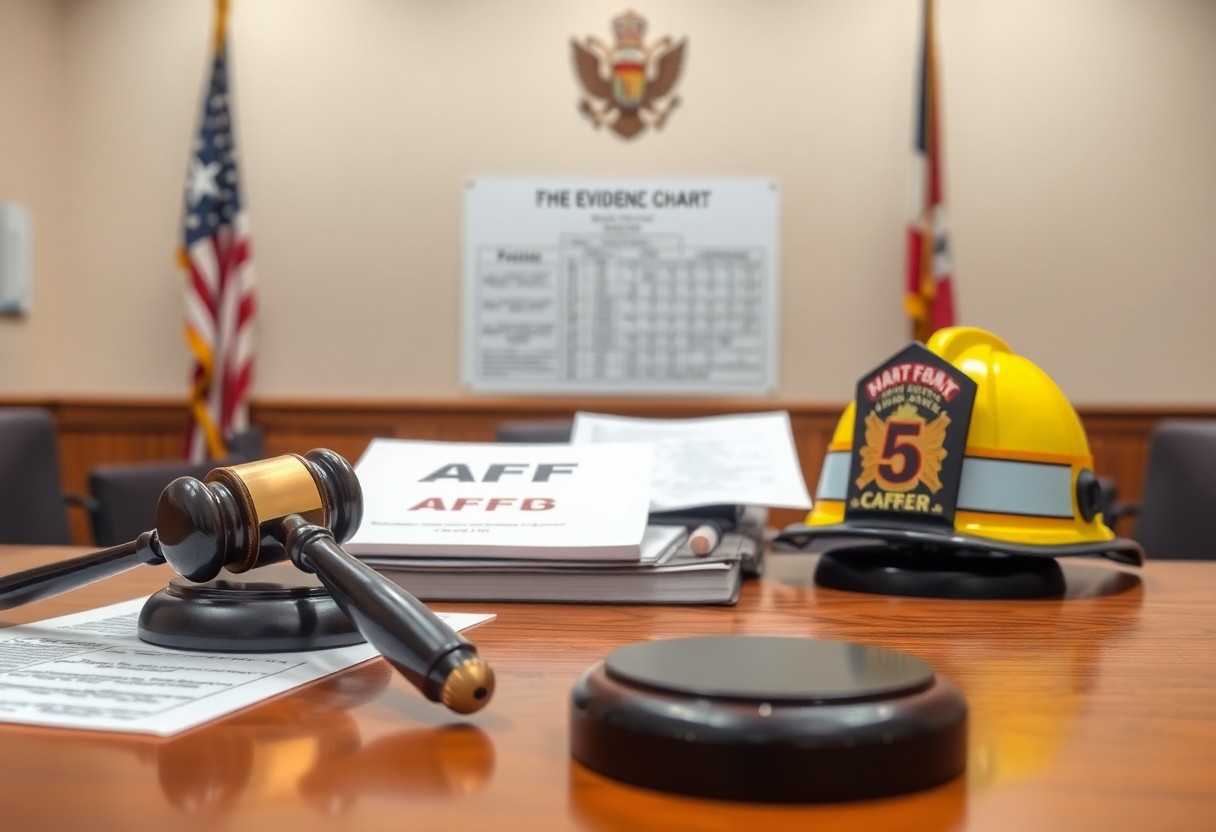It’s crucial to navigate the complexities of an AFFF lawsuit effectively to secure a favorable outcome. By understanding key strategies and leveraging expert legal advice, you can significantly strengthen your case. Your ability to gather evidence and articulate how AFFF exposure has impacted your life will play a pivotal role in your success. This blog post outlines crucial tips from experienced attorneys that can guide you through this challenging process and improve the likelihood of a positive result in your legal battle.
Understanding AFFF and Its Health Risks
Your awareness of AFFF (Aqueous Film Forming Foam) is important, especially if you have been exposed to it. Originally designed for firefighting, AFFF contains per- and polyfluoroalkyl substances (PFAS), which are linked to various health issues. Understanding this chemical can give you insights into its potential risks.
What is AFFF?
AFFF is a fire-suppressant foam widely used in emergency response situations. Its unique formulation enables rapid suppression of flammable liquid fires. However, the inclusion of PFAS has raised significant health concerns, prompting many individuals and organizations to reconsider its use.
Health Implications of AFFF Exposure
Risks associated with AFFF exposure can lead to serious long-term health consequences. Prolonged exposure to PFAS has been linked to various ailments, including cancer, immune system dysfunction, and hormonal changes. If you have been in situations where AFFF was used, monitoring your health closely is important for identifying any related issues.
Understanding the implications of AFFF exposure is vital for your health. Studies have shown that PFAS can accumulate in your body, leading to a range of health problems. Increased risks of kidney and testicular cancer, liver damage, and thyroid disease are among the most dangerous effects linked to long-term exposure. Chronic exposure may also result in reproductive issues and developmental delays in children. Being informed about these risks empowers you to take proactive steps in seeking the necessary medical evaluations or legal recourse, should you need it.
The Importance of Choosing the Right Attorney
If you want to succeed in your AFFF lawsuit, selecting the right attorney is vital. Your choice can greatly influence the outcome of your case, as an experienced lawyer will understand the complexities of AFFF litigation. They will not only provide you with the necessary legal guidance but also advocate fiercely on your behalf. Ensure you choose someone who has a genuine commitment to fighting for your rights and maximizing your compensation.
Experience in AFFF Cases
For effective representation, seek an attorney who specializes in AFFF cases. Attorneys with direct experience in this field are better equipped to handle the unique challenges these lawsuits present. They will be familiar with the applicable laws, key evidence, and the tactics often employed by large manufacturers to undermine your claim. Their expertise will help you navigate the complexities and build a stronger case.
Evaluating Track Record and Success Rate
To determine the right attorney for your AFFF case, evaluate their track record and success rate. Look for evidence of past settlements and trial victories in similar cases. This can provide you with insight into their ability to secure favorable outcomes for their clients. An attorney’s reputation in the community and among peers can also be a telling sign of their competency.
Attorney success in previous AFFF cases is an indication of their skill level and knowledge of the legal strategies that work best in this complex area of law. Review their history of settlements and verdicts, especially those that resulted in significant compensation for their clients. Additionally, consider seeking testimonials from former clients which can provide insight into their communication, dedication, and effectiveness as legal representatives. Overall, choosing an attorney with a strong record in AFFF cases can significantly bolster your chances of achieving a positive outcome.
Key Evidence to Gather for Your Case
Some of the most vital pieces of evidence to support your AFFF lawsuit include medical records, documentation related to AFFF usage, and expert testimonies. Collecting this evidence can help your attorney build a convincing case and establish the link between AFFF exposure and your health issues.
Medical Records and Expert Testimonies
Your medical records serve as important proof of the health problems you are experiencing due to AFFF exposure. Additionally, expert testimonies can substantiate your claims, demonstrating how AFFF leads to adverse health effects, thus strengthening your case.
Documents Related to AFFF Usage
Medical records strengthen your case, while documents related to AFFF usage provide vital context. You should gather any employment records, firefighting logs, or manufacturing reports detailing your exposure. These documents will help illustrate the extent of your exposure, contributing to your attorney’s argument about the link between AFFF and your resulting health complications.
Hence, obtaining these documents is important as they provide evidence of your past interactions with AFFF products. Establishing a timeline of exposure through records can significantly affect the outcome of your case. Additionally, including detailed accounts of the locations and reasons for AFFF use can help corroborate your claims about the level of risk you faced, ultimately influencing the court’s perspective on your situation.
Legal Process Overview for AFFF Lawsuits
Unlike many legal cases, AFFF lawsuits involve a series of complex procedures tailored to address the specific harms caused by Aqueous Film-Forming Foam exposure. Understanding this process can significantly impact your case’s outcome. It’s important to be aware of the key stages involved, including filing your complaint, the discovery phase, and the trial itself, so you can navigate the legal landscape confidently.
Filing the Complaint
For your case to move forward, you first need to file a complaint in the appropriate court. This document outlines your allegations against the defendants, detailing how the AFFF exposure has harmed you and the legal grounds for your case. Ensuring that your complaint is comprehensive and accurate is vital, as this will set the foundation for your legal fight.
Discovery Phase and Depositions
Below the surface of the courtroom drama, the discovery phase is where significant information exchange occurs between parties. This is your opportunity to gather evidence about your exposure, including documents, expert testimonies, and depositions from critical witnesses involved in AFFF use and production.
Process during the discovery phase includes interrogatories and document requests, allowing you to obtain important information that supports your claims. Additionally, depositions are taken to question witnesses and experts under oath, which can help uncover facts that may strengthen your case. It’s important to approach this phase with a clear strategy; the information you gather can significantly impact the course of your lawsuit and potentially lead to a favorable resolution.
Strategies for Strengthening Your Case
To strengthen your case, it’s crucial to gather comprehensive evidence, including medical records, incident reports, witness testimonies, and expert opinions. Ensure that all documentation is well-organized and easily accessible for your attorney. Consider consulting with professionals experienced in AFFF lawsuits to guide you through the legal nuances and establish a stronger foundation for your claim.
Building a Solid Narrative
Around your case, you should weave a compelling narrative that connects the dots between your experiences and the harm caused by AFFF exposure. This narrative should not only detail your personal journey but also highlight the broader implications of the case, creating a relatable story that resonates with judges and juries alike.
Engaging in Effective Negotiations
After you’ve built a solid case, the next step is to engage in effective negotiations. This phase is vital in working towards a settlement that serves your best interests.
Understanding the negotiation landscape can significantly impact your case outcome. Effective negotiation involves clear communication of your damages and needs while also being open to potential compromises. A well-prepared attorney can play an integral role, as they understand the tactics used by insurance companies and opposing counsel. Be aware of time constraints and counteroffer tactics that may create pressure. Always aim for a settlement that reflects the full extent of your injuries and losses, ensuring you do not rush into an agreement that could compromise your rights.
Common Pitfalls to Avoid in AFFF Lawsuits
Now that you are considering an AFFF lawsuit, it’s vital to be aware of common pitfalls that could jeopardize your case. Proper navigation through the legal process is key, and many individuals unknowingly make mistakes that could impact their claims. From delays to insufficient evidence, avoiding these missteps will enhance your chances of a favorable outcome.
Delays and Statute of Limitations
Statute of limitations refers to the time limit within which you must file your lawsuit. If you wait too long, your claim may be barred, and you could lose your right to seek compensation. Each state has specific deadlines, and recognizing these limits is vital; taking action sooner rather than later ensures that you don’t miss out on your opportunity for justice.
Incomplete Evidence Gathering
Below, you’ll find that gathering all pertinent evidence is crucial for a successful AFFF lawsuit. Incomplete evidence can significantly weaken your case, making it challenging for your attorney to present a strong argument. This includes medical records, employment history, and documentation of your exposure to AFFF, all of which help establish liability.
Plus, ensuring that you have thorough and comprehensive evidence can significantly bolster your claim. Missing documentation may lead to delays or dismissed claims, ultimately impacting your chances of receiving the compensation you deserve. Take proactive steps to gather witness statements, medical evidence, and any relevant records early on to support your case effectively.
Final Words
Conclusively, your success in an AFFF lawsuit hinges on thorough documentation, understanding the legal landscape, and working closely with experienced attorneys who can navigate the complexities of your case. By gathering robust evidence and maintaining clear communication with your legal team, you can enhance your chances of a favorable outcome. Always prioritize your health and well-being throughout the process. With the right approach and guidance, you can effectively advocate for your rights and seek the compensation you deserve.

















